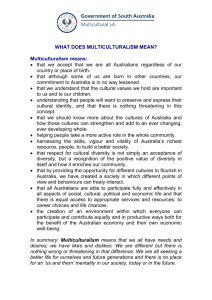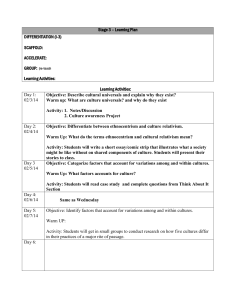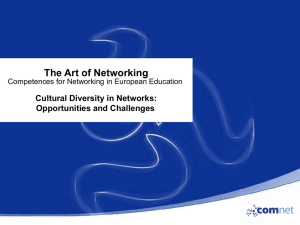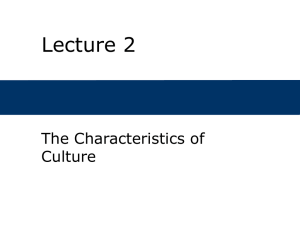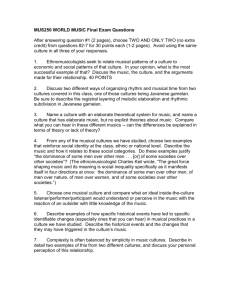Jews, Confucians, and Protestants: Cultural Capital, and the End of
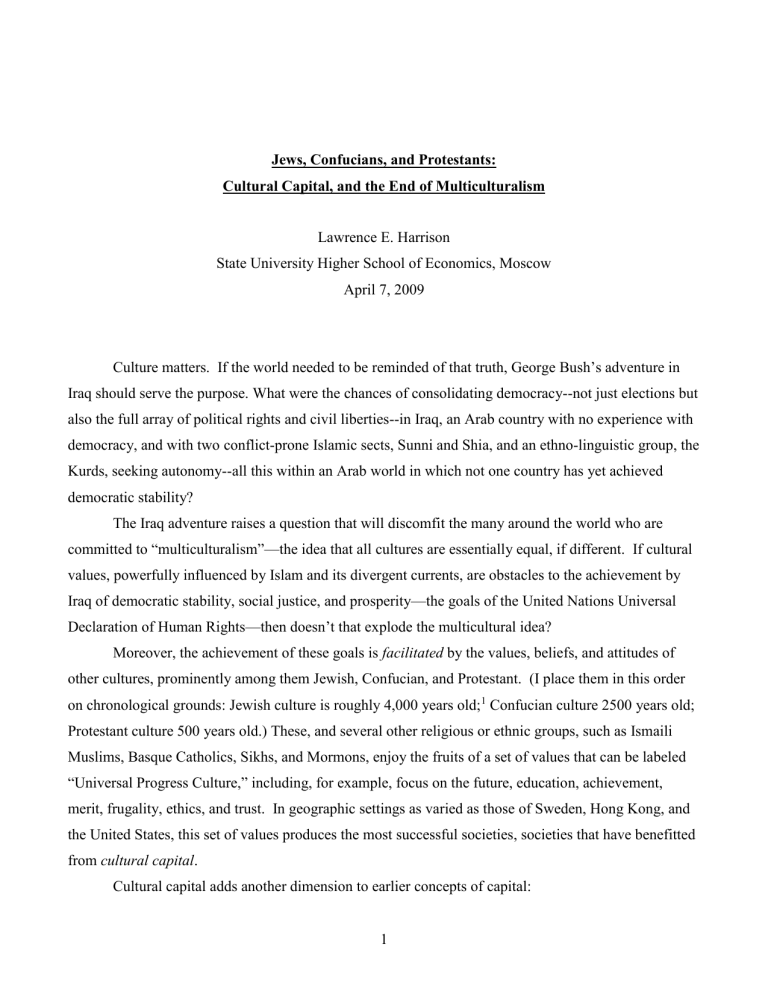
Jews, Confucians, and Protestants:
Cultural Capital, and the End of Multiculturalism
Lawrence E. Harrison
State University Higher School of Economics, Moscow
April 7, 2009
Culture matters. If the world needed to be reminded of that truth, George Bush’s adventure in
Iraq should serve the purpose. What were the chances of consolidating democracy--not just elections but also the full array of political rights and civil liberties--in Iraq, an Arab country with no experience with democracy, and with two conflict-prone Islamic sects, Sunni and Shia, and an ethno-linguistic group, the
Kurds, seeking autonomy--all this within an Arab world in which not one country has yet achieved democratic stability?
The Iraq adventure raises a question that will discomfit the many around the world who are committed to “multiculturalism”—the idea that all cultures are essentially equal, if different. If cultural values, powerfully influenced by Islam and its divergent currents, are obstacles to the achievement by
Iraq of democratic stability, social justice, and prosperity—the goals of the United Nations Universal
Declaration of Human Rights—then doesn’t that explode the multicultural idea?
Moreover, the achievement of these goals is facilitated by the values, beliefs, and attitudes of other cultures, prominently among them Jewish, Confucian, and Protestant. (I place them in this order on chronological grounds: Jewish culture is roughly 4,000 years old; 1 Confucian culture 2500 years old;
Protestant culture 500 years old.) These, and several other religious or ethnic groups, such as Ismaili
Muslims, Basque Catholics, Sikhs, and Mormons, enjoy the fruits of a set of values that can be labeled
“Universal Progress Culture,” including, for example, focus on the future, education, achievement, merit, frugality, ethics, and trust. In geographic settings as varied as those of Sweden, Hong Kong, and the United States, this set of values produces the most successful societies, societies that have benefitted from cultural capital .
Cultural capital adds another dimension to earlier concepts of capital:
1
• Financial/resource/property capital, associated with Adam Smith and Karl Marx
• Human capital—the quality of the work force, associated with Gary Becker
• Social capital—the tendency of a society to encourage association of its members, most recently addressed by Robert Putnam and Francis Fukuyama
Cultural capital is intimately linked to human and social capital; it can be viewed as a key facilitator of both. Human capital will be richer in societies that value achievement and education; social capital will be richer in societies that emphasize ethical conduct and trust.
The End of Multiculturalism
Since the 1960s, multiculturalism has increasingly become a dominant feature of the political and intellectual landscape of the West, and particularly in the United States, Canada, and Europe, where immigration is significantly altering the ethnic and religious composition of societies. It is noteworthy, and relevant, that during the past few decades, the level of trust in the United States, Canada, Britain,
Ireland, and Poland, as measured by the World Values Survey, has declined sharply.
2 Robert Putnam recently identified immigration as a major contributor to the decline, at least in the United States: “ The short run effect of being around people who are different from us is to make all of us uncertain – to hunker down, to pull in, to trust everybody less. Like a turtle in the presence of some feared threat, we pull in.” 3
Multiculturalism has also become a dominant theme in international development, for example in the World Bank, where economic historian David Landes's assertion at a conference in 2000 that some cultures are "toxic" for development shocked much of the audience.
4 And multiculturalism is strongly implied in the Bush Administration doctrine, "These values of freedom are right and true for every person, in every society,"
But multiculturalism rests on a frail foundation: cultural relativism, the notion that no culture is better or worse than any other--it is merely different. Anthropologist Ruth Benedict, author of the classic study of Japanese culture, The Chrysanthemum and the Sword , wrote that all cultures are
"'coexisting and equally valid patterns of life, which mankind has created for itself from the raw materials of existence.' In her view…each culture is self-contained, autonomous, separate but equal.
Each makes sense in its own context, and all you have to do is know the context to understand what the people are doing and why they’re doing it."
5
2
That's doubtlessly good advice for cultural anthropologists doing ethnographic studies in the field. If one's goal is full understanding of a value system quite different from one's own, ethnocentrism can seriously distort the quest and the conclusions. But what if the objective is to assess the extent to which a culture facilitates progress toward democratic governance, social justice, and an end to poverty-
-the goals of the UN Universal Declaration of Human Rights? In this case, cultural relativism becomes a huge impediment, because the assessment presupposes that some cultures are more nurturing of progress than others and challenges the very essence of cultural relativism—and multiculturalism..
Religious Relativism
Religion is a principal source of values, beliefs, and attitudes, the aspects of culture most relevant to the behaviors that powerfully influence the way a society evolves.
Consistent with cultural relativism, there exists today a widespread presumption that all religions must be regarded as of equal worth, and in any event are not to be the object of comparative value judgments. That presumption--let's label it religious relativism--is the dominant one in the West. However, when it comes to the relationship between religion and human progress, I find compelling evidence that some religions do better than others in promoting the goals of democratic politics, social justice, and prosperity.
Voodoo, the dominant religion in Haiti, is a case in point. Haiti is by far the poorest, least literate, most misgoverned country in the Western Hemisphere. Voodoo is a religion of sorcery in which hundreds of spirits, very human and capricious, control human destinies. The only way to gain leverage over what happens in one's life is to propitiate the spirits through the ceremonial intervention of the
Voodoo priests and priestesses. Voodoo is without ethical content and, consequently, a major contributor to the high levels of mistrust, paranoia, sense of helplessness, and despair noted in the anthropological literature about Haiti.
Voodoo's roots are in the Dahomey region of West Africa — today the country of Benin. The indicators of income, child malnutrition, child mortality, life expectancy and literacy are virtually identical for Haiti and Benin.
The roots of much of the population of Barbados are also in Dahomey. But unlike Haiti, which won its independence from France in 1804 through an uprising of the slaves, Barbados gained its independence from Britain peacefully in 1966, at which time the descendants of the slaves first imported to the island in the first half of the seventeenth century dominated politics and a good part of the economy. During three centuries, they had so acculturated to British values and institutions that they are
3
sometimes referred to as "Afro-Saxons" or "Black Englishmen." The dominant religion is the Church of
England.
Today, Barbados is a prosperous democracy, number 31 on the 2006 UN Human Development
Index, ahead of the Hungary, Argentina, Poland, and Chile. It is approaching First World status. Haiti is number 154 (of 177 countries). Culture matters. Race doesn’t.
The Economists’ “Relativism”
Cultural and religious relativism furnish the principal intellectual foundation of multiculturalism.
But economics also contributes a pillar.
Many economists would like to ignore culture. As the former World Bank economist William Easterly, author of The White Man's Burden , wrote in reviewing my book Who Prospers?
, "Maybe there is a lot to be said for the old-fashioned economist's view that people are the same everywhere and will respond to the right economic opportunities and incentives." 6
That was in 1994. Today, Easterly sees the world quite differently: “I am far more open to the importance of social norms, individual values...in short, culture.” 7 Like me, he has noted that in multicultural countries where the economic opportunities and incentives are available to all, some ethnic or religious minorities often do much better than majority populations, as in the case of Chinese immigrants in Indonesia, Malaysia, Costa Rica, and the United States, among others.
Why has the "Washington Consensus" prescription of free market economics worked well in
India and poorly in Latin America, where socialism, even authoritarian socialism in the case of Hugo
Chávez's Venezuela, appears to be alive and well and where only Chile has been able to achieve transforming rates of sustained economic growth? Cultural factors are not the whole explanation, but surely they are relevant.
Alan Greenspan got it right when he said, after the collapse of the Russian economy in 1998-99,
"I used to assume that capitalism was human nature...it was not human nature at all, but culture."
Foreign Policy Implications: Iraq and Afghanistan
Cultural capital matters, then, by influencing the degree of receptivity of a society to democratic institutions and the degree to which the society produces and encourages entrepreneurs. What then are the implications for a foreign policy a fundament of which was the doctrine "These values of freedom are right and true for every person, in every society," a doctrine suffused with multiculturalism and with roots going back at least to Woodrow Wilson? The Bush Administration staked huge human, financial,
4
diplomatic, and prestige resources on the doctrine's applicability in Iraq. It is now apparent that the doctrine is ungrounded.
Moreover, it is increasingly apparent that the Iraq experience is relevant to Afghanistan, a traditional society in which, in the period 2000-2004, 43 percent of males and 13 percent of females were literate, according to UNICEF data.
8
Francis Fukuyama argues that in the long run, all human societies will converge on the democratic-capitalist model because it has proven itself to be the most successful way of harnessing human nature to produce progress.
9 I agree, even in the light of the battering that capitalism has taken in the economic crisis of 2008-9. But what about the short run? What are the chances of consolidating democracy in Iraq--not just elections, which can be arranged in just about any country, for example
Haiti--but also the full array of political rights and civil liberties?
To assess the possibilities of a successful promotion of democracy in Iraq, we might start with an assessment of the condition of democracy in Arab countries more generally. Freedom House's 2006 rankings, in which 2 is best and 14 is worst, produce an average of 11 for 15 Arab countries. By contrast, most First World countries are ranked 2 by Freedom House. In those same 15 Arab countries, the UN Human Development Report 2004 presents data on literacy that average out at 77% for males,
57% for females. More than half of females are illiterate in Iraq, Egypt, and Morocco. In Yemen, 70% of males are literate, 29 percent of females.
While stable democracy may not depend on high levels of female literacy, as India, where female literacy is about 50 percent, demonstrates, it must surely be enhanced by literate women, particularly since women play the lead role in child rearing. The data on gender literacy underscore the subordination of women to men in contemporary Islam.
If nothing else, the Iraq adventure demonstrates the enormous risks that attend a foreign policy predicated on a multicultural world view. But it also underscores the need for appreciation of the role cultural capital plays in foreign affairs.
Multiculturalism and Development Assistance
Development assistance institutions, both multilateral and bilateral, have thus far failed to address cultural change chiefly because culture-blind economists, and anthropologists and other social scientists committed to cultural relativism, have dominated policy. That some cultures are more prone to progress than others is a message that goes down very hard in development circles, the evidence to
5
the contrary notwithstanding. This obstacle is magnified by the politics of the international institutions, where both donors and recipients have a voice, and where it is much more interpersonally comfortable, and less threatening to self-esteem, to view the countries lagging behind as either the victims of the more successful countries, or as having failed thus far to find the proper content and mix of policies, incentives, and institutions.
Representative of this intellectual/emotional obstacle is the negative reception in some Arab circles to the four courageous UNDP Arab Human Development Reports (2002-05) . All four focus on the need for cultural change; the 2005 Report promotes gender equality.
Symptomatic of the multiculturalist environment at the World Bank was an encounter I had after having made a presentation on culture at a World Bank Poverty Reduction Conference a few years ago.
(I assume that I had been invited to speak because of the popularity of Culture Matters , co-edited by
Samuel Huntington and me, at the World Bank bookstore. I had had several prior contacts with the
Bank that had sensitized me to the institutional hostility to anything that challenged cultural relativism. )
During the question/comment period, an African employee of the Bank said, with some fire in her eyes,
"I thought we had put 'blaming the victim' explanations behind us long ago."
I can only hope that the persistent, widespread dissatisfaction and frustration with the sluggish pace of progress in most poor countries will cause development assistance institutions to ponder the message of Culture Matters and The Central Liberal Truth , my most recent book. The considerable intelligence, creativity, and dedication of development professionals over the past half-century have not succeeded in transforming the large majority of poor, authoritarian societies. Where transformations have occurred, they usually either have been nurtured by cultures high in cultural capital (e.g., the
Confucian societies of East Asia) or have been cases where cultural change that has increased cultural capital has been central to the transformation (e.g., Spain, Ireland, Quebec).
* * * * *
Cultural Capital Defined
Cultural Capital is a set of values, beliefs, and attitudes that drive societies toward the goals of the UN Universal Declaration of Human Rights:
• Democratic governance, including rule of law;
• Social justice, including education , health care, and opportunity for all; and,
6
• Elimination of poverty.
These values, beliefs, and attitudes have been disaggregated in the following Typology of
Progress-Prone and Progress-Resistant Cultures. As we review the typology, it will become apparent how Cultural Capital powerfully influences Human Capital and Social Capital.
I have found helpful a diagram in Geert Hofstede’s book Culture’s Consequences that presents the three fundamental forces that motivate human behavior as three slices of a triangle: the base is human nature; the apex is individual personality; and in between lies culture: 10
Disaggregating “Culture”
In 1999, the Argentine scholar and journalist Mariano Grondona published a book entitled Las
Condiciones Culturales del Desarrollo Económico ( The Cultural Conditions of Economic
Development ).
11 Grondona is a columnist for La Nación , a leading Buenos Aires newspaper; a professor of government at the National University of Buenos Aires; and the host of a popular weekly public affairs television show. He has also taught at Harvard.
Over several years of thought and observation, Grondona evolved a theory of development that is captured in a typology of cultural characteristics that contrasts cultures that are favorable to economic development—high in cultural capital--with those that resist it—low in cultural capital. In his words, drawn from a chapter in Culture Matters that derives from his book:
Values can be grouped in a consistent pattern that we may call a 'value system.' Real value systems are mixed; pure value systems exist only in the mind, as ideal types. It is possible to construct two ideal value systems: one including only values that favor economic development and the other including only values that resist it. A nation is modern as far as it approaches the former system; it is deemed traditional as far as it approaches the latter. Neither of these value systems exists in reality, and no nation falls completely within ether of those two value systems.
However, some countries approach the extreme favorable to economic development, whereas others approach the opposite extreme.
Real value systems are moving as well as mixed. If they are moving toward the favorable value-system pole, they improve a nation's chances of developing. If they move in the opposite direction, they diminish a nation's chances of developing.
*12
7
Four of Grondona’s colleagues contributed to the expansion of the typology to embrace political and social as well as economic development: Irakli Chkonia, Ronald Inglehart, Matteo Marini, and I.
I want to reemphasize Grondona’s characterization of the typology as “idealized.” It is also highly generalized. There is no monolithic culture; all cultures have crosscurrents to their mainstreams, and that is as true of the Argentine/Latin American culture that served as the model for the progressresistant column of the typology as it is for American culture, the model for the progress-prone culture.
This is an extremely important point. As Boston University anthropologist Robert Hefner reminds us,
“…this theme [of variety within cultures] allows us to recognize that even in relatively progress unfriendly cultures, there are alternative streams at work, some of which may contain bits and pieces of progressive values.” 13
Typology of Progress-Prone (High Cultural Capital) and Progress-Resistant (Low Cultural Capital) Cultures
Based on the original structure of Mariano Grondona with inputs from Irakli Chkonia, Lawrence
Factor
Harrison, Matteo Marini, and Ronald Inglehart
High Cultural Capital Low Cultural Capital
WORLDVIEW
1. Religion Nurtures rationality, achievement;
promotes material pursuits; focus on this world; pragmatism
2. Destiny I can influence my destiny for the better.
3. Time orientation Future focus promotes planning, punctuality, deferred gratification
4. Wealth
5. Knowledge
VALUES, VIRTUES
6. Ethical code
7. The lesser virtues
8. Education
Product of human creativity, expandable (positive sum)
Practical, verifiable; facts matter
Rigorous within realistic norms; feeds trust
A job well done, tidiness, courtesy, punctuality matter
Indispensable; promotes autonomy,
Nurtures irrationality; inhibits material pursuits; focus on the other world; utopianism
Fatalism, resignation, sorcery
Present or past focus discourages planning, punctuality, saving
What exists (zero-sum)
Abstract, theoretical, cosmological, not verifiable; debate matters
Elastic, wide gap twixt utopian norms and behavior=mistrust
Lesser virtues unimportant; love, justice, courage matter
Less priority; promotes depend-
8
ECONOMIC BEHAVIOR
9. Work/achievement
10. Frugality
11. Entrepreneurship
12. Risk propensity
13. Competition
14. Innovation
15. Advancement
SOCIAL BEHAVIOR
16. Rule of law/corruption
17. Radius of identification
and trust
18. Family
19. Association (social
capital)
20. The individual/the group
21. Authority
22. Role of elites
23. Church-state relations
24. Gender relationships
25. Fertility heterodoxy, dissent, creativity
Live to work: work leads to wealth
The mother of investment and prosperity
Investment and creativity
Moderate
Leads to excellence
Open; rapid adaptation
Merit, achievement
Reasonably law abiding; corruption is prosecuted
Stronger identification with the broader society
The idea of “family” extends to the the broader society
Trust, identification breed coopera- tion, affiliation, participation
Emphasizes the individual but not excessively
Dispersed: checks and balances, consensus
Responsibility to society
Secularized; wall between church and state
If not a reality, equality at least not inconsistent with value system
The number of children should depend on the family’s capacity to raise and educate them
9 endency, orthodoxy
Work to live: work doesn't lead to wealth; work is for the poor
A threat to equality
Rent-seeking
Low; occasional adventures
Aggression; A threat to equality--and privilege
Suspicious; slow adaptation
Family, patron, connections
Money, connections matter; corruption is tolerated
Stronger identification with the narrow community
The family is a fortress against the broader society
Mistrust breeds excessive individualism, anomie
Emphasizes the collectivity
Centralized: unfettered, often arbitrary
Power and rent seeking; exploitative
Religion plays major role in civic sphere
Women subordinated to men in most dimensions of life
Children are the gifts of God; they are an economic asset
The Position of Russia
The second table that you have is an assessment of Russia, part of an analysis of 117 countries that lists their performance on ten indicators of progress:
1.
The United Nations Human Development Report 2007 Index, which combines health, education, and income data
2.
Literacy data from the United Nations Human Development Report 2007
3. Female literacy data from the United Nations Human Development Report 2007
4. Fertility data from the United Nations Human Development Report 2007
5. Freedom House 2007 survey, which rates countries on political rights and civil liberties
(scale 1 for freest to 7 for least free for each: total 2 is best, total 14 is worst)
6. Date of start of democratic continuity (my estimate)
7. Per capita gross domestic product from the World Bank’s World Development Report 2007
8. Income distribution (Gini coefficient) from the World Bank’s World Development Report
2007 (lower number indicate greater equitability)
9. Trust, from the World Values Survey 2000 (percent of respondents who believe that people in general can be trusted)
10. Transparency International’s Corruption Perceptions Index 2007
HERE INSERT RUSSIA ET AL TABLE
Cultural Change
Cultural values, beliefs, and attitudes are not in our genes. They are acquired in the home, the school, the church, through the media, peer relationships, and the influence of leaders with a vision, particularly political leaders. The “miracle” transformations of the twentieth century, for example
Turkey after the collapse of the Ottoman Empire, South Korea, Spain, and Ireland, have all involved value, attitude, and belief transformations that have increased cultural capital.
10
The Cultural Change Institute was established at the Fletcher School at Tufts University in 2007 to promote cultural capital through research, pilot projects, and technical assistance in contexts as varied as Costa Rica, Timor Leste, Iran, and the state of California. These and other CCI activities include modifications to traditional child rearing practices: educational and religious reform that emphasizes democratic behavior, social justice, and creativity; the role of the media in the promotion of cultural capital; and the use of cultural analysis to improve business performance.
Culture matters, culture changes. Efforts to enhance cultural capital by political, religious, intellectual, media, and business leaders can accelerate progress toward the three key goals of the UN
Universal Declaration of Human Rights: democratic governance; social justice, above all with respect to health and education; and an end to poverty.
Lawrence Harrison directs the Cultural Change Institute. He is the author or editor of seven books on the role of cultural values, beliefs, and attitudes in development. From 1965 to 1981 he directed USAID missions in five countries around the Caribbean Basin. This article derives from the introduction to a new book he is working on, with the same title as the article, to be published in 2010.
1 In A History of the Jews (New York: Harper and Row, 1988) Paul Johnson dates Judaism from the time of Abraham, about 2,000 BC. The Hebrew calendar year, in early 2009 as this is written, is
5769—the starting date is Creation, which means that something like 1,750 years passed before
2
Abraham.
3
4
http://www.hks.harvard.edu/news-events/publications/insight/democratic/robert-putnam
Landes used the word “toxic” in a conference, “Culture Counts,” sponsored by the World Bank in
Florence in the summer of 2000. That comment, and Culture Matters , which contains a chapter by
Landes, and which was a best-seller at the World Bank bookstore, may have contributed to the World
5
Bank’s decision to publish Culture and Public Action (Palo Alto CA: Stanford Social Sciences, 2004)
6
Renato Rosaldo, "Of Headhunters and Soldiers," Issues in Ethics , v. 11, N. 1 Winter 2000
William Easterly, The White Man's Burden: Why the West's Efforts to Aid the Rest Have Done So
Much Ill and So Little Good (New York: The Penguin Press, 2006); the World Bank and the IMF,
7
Finance and Development , March 1994, 51.
8
From an e-mail to me dated January 28, 2009.
9 http://www.unicef.org/infobycountry/afghanistan_statistics.html
10
Francis Fukuyama, The End of History and the Last Man (New York: Harper Perennial: 1993)
11
12
CHECK HOFSTEDE
Buenos Aires: Grupo Editorial Planeta, 1999.
13
Mariano Grondona, "A Cultural Typology of Economic Development," in Culture Matters , pp. 46-7.
Memo to me, 28 April 2004
11
TEN INDICATORS OF PROGRESS:
INDICATOR USA FINLAND ISRAEL
Total population (millions)
UN INDEX: 1 to 177
LITERACY
FEMALE LITERACY
296 000
000
12
99%
99%
5 200
000
11
99%
99%
7 000
000
23
97%
98%
FERTILITY (#kids/woman)
FREEDOM: 1 best, 7 worst
DEMOCRACY CONTINUITY
2
1
1776
1,8
1
1919
2,9
1,5
1948
TURKEY
72 000 000
84
87%
80%
2,2
3
1983
PER CAPITA GDP
INCOME DISTRIBUTION*
TRUST**
CORRUPTION: 10 is best
*lower is more equitable
**percent who believe that most people can be trusted
$41 950 $31 170 $25 280
40,8
36%
7,2
26,9
58%
9,4
39,2
23%
6,1
$8 420
43,6
16%
4,1
ESTONIA RUSSIA
1 300 000 143 000
000
44
99%
99%
67
99%
99%
1,4
1
1,3
5,5
1992 not applicable
$15 420 $10 640
35,8
23%
6,5
39,9
24%
2,3
12
